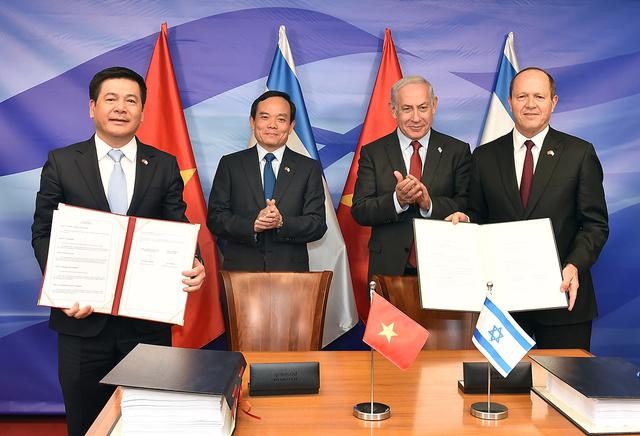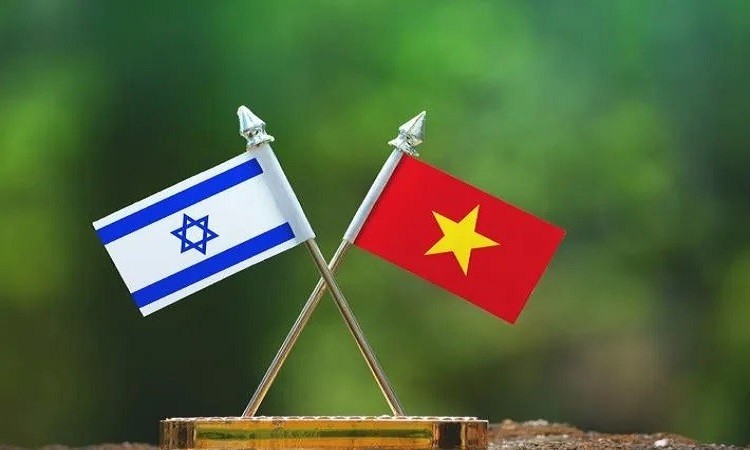
Vietnam-Israel Free Trade Agreement (VIFTA): Vietnam-Israel highway is open now
Latest
 |
| VIFTA will contribute to reducing production and business costs, improving the competitiveness of Vietnamese goods in neighboring markets such as the Middle East, North Africa, and Southern Europe. (Photo: VGP) |
Israel is the first West Asian country to sign an FTA with Vietnam, and vice versa, Vietnam is the first Southeast Asian country to sign an FTA with Israel. Through this cooperation, Vietnam and Israel expect to make progress significantly in terms of investment, services, digital transformation, and technology.
Unlimited cooperation
VIFTA consists of 15 chapters and annexes with basic contents such as trade in goods, services - investment, rules of origin, technical barriers to trade (TBT), sanitary and phytosanitary measures (SPS), customs, trade defense, government procurement, legal - institutional.
Thanks to the their strong commitments to raise the rate of trade liberalization (Israel 92.7% of tariff lines; Viet Nam 85.8% of tariff lines at the end of the commitment schedule), the two sides expect two-way trade to grow rapidly, and the target of 3 billion USD and higher will be achieved in the coming time.
Due to the non-competitiveness in economic structure, there is a number of advantages in bilateral cooperation. There’s hardly any competition between the products of the two countries, however they complement each other's markets. Bilateral import and export will fill the gap in each other's economies, promoting development in the coming years.
According to Mr. Ze'ev Lavie, representative of the Federation of Israeli Chambers of Commerce (FICC), products that Israel has a great import demand are also Vietnam's export strengths. Israeli importers are interested in the Vietnamese market and consider Vietnam a stable source of goods, services and logistics in Asia.
Israel is currently one of Viet Nam's major trade, investment and labor partners in West Asia. VIFTA will contribute to reducing production and business costs, improving the competitiveness of Vietnamese goods in neighboring markets such as the Middle East, North Africa, and Southern Europe.
On the other hand, with Vietnam's population of more than 100 million people, Israeli goods and technology have the opportunity to access markets in Southeast Asia, Asia-Pacific and other major economies in all 16 FTAs that Viet Nam is a member of.
 |
| VIFTA consists of 15 chapters and annexes with basic contents such as trade in goods, services - investment, rules of origin, technical barriers to trade (TBT)... (Source: TTDN) |
More representation in West Asia
VIFTA will help Vietnam diversify, multilateralize and expand trade relations with regions like West Asia, Southwest Asia, which the country currently has relatively limited economic relations and wishes to expand. At the same time, the country wants to diversify investment sources in the context of world economic difficulties.
According to experts, the agreement clearly shows Vietnam's policy of comprehensive and extensive integration into the world economy and expanding relations with all economies. At the same time, the agreement helps to diversify import and export markets for Vietnamese goods, as well as to enjoy preferential tariffs more easily for Israeli products and high-tech goods.
Israel is a high-tech economy, with significant advances in technology and scientific research. Their technology advancements can even match the leading developed countries in the world, especially technology in agriculture. Therefore, this FTA will not only further boost trade relations between the two countries but also attract investment in high-tech agriculture, an area that Vietnam needs but has not developed its full potential.
Recently, Vietnam tends to have a trade deficit from Israel, due to importing a large number of high-value goods, such as computer, circuit boards and electronic components, for manufacturing and processing finished products. These are mostly part of foreign-invested enterprises’ chain of operations.
Additionally, Vietnam’s goal is to strive to conquer the West Asian market, Israel plays a key role for Vietnamese goods to be more present and to access more opportunities in this region.
Searching for opportunities in Southeast Asia
Even though it is a small country, Israel has a very strong foreign trade economy. Israel's population is only 1/10 of Vietnam's, about 10 million people, but the per capita income is about 55,000 USD/year. Israel's annual trade averages over 173 billion USD.
However, it doesn’t have an abundant of resources since desert occupies almost 70% of the area of Israel. The country mainly imports, especially consumer goods. According to published data, each year, Israel's import turnover for these items is about 35 billion USD.
According to Asian News International, Israel's interest in Vietnam is also due to great opportunities in Southeast Asia. Vietnam is considered an important member in ASEAN, where Israel does not have diplomatic relations with some other members such as Malaysia and Indonesia.
“Vietnam is the best access point from which Israel can develop economic ties with other ASEAN countries. Taking advantage of tariff preferences, Israeli goods can better compete with similar products from other countries with which Vietnam already has free trade relations”, said Ms. Einat Halevy Levin, Chairman of the Israel - Vietnam Chamber of Commerce (IVC).
“The business environment in Vietnam has become much more favorable. Israeli companies understand that, if they want to set foot in Southeast Asia, Vietnam is a good starting point, better than other countries”, she added.
Ms. Einat Halevy Levin said that, the biggest obstacle that Israeli entrepreneurs often face is that they don’t spend much time learning about Vietnamese business culture. Meanwhile, the challenge for Vietnamese businesses is about competitiveness. Israel is a partner with great competitiveness, very developed science and technology, so Vietnamese businesses must pay special attention to improving the quality to export consumer goods.





















